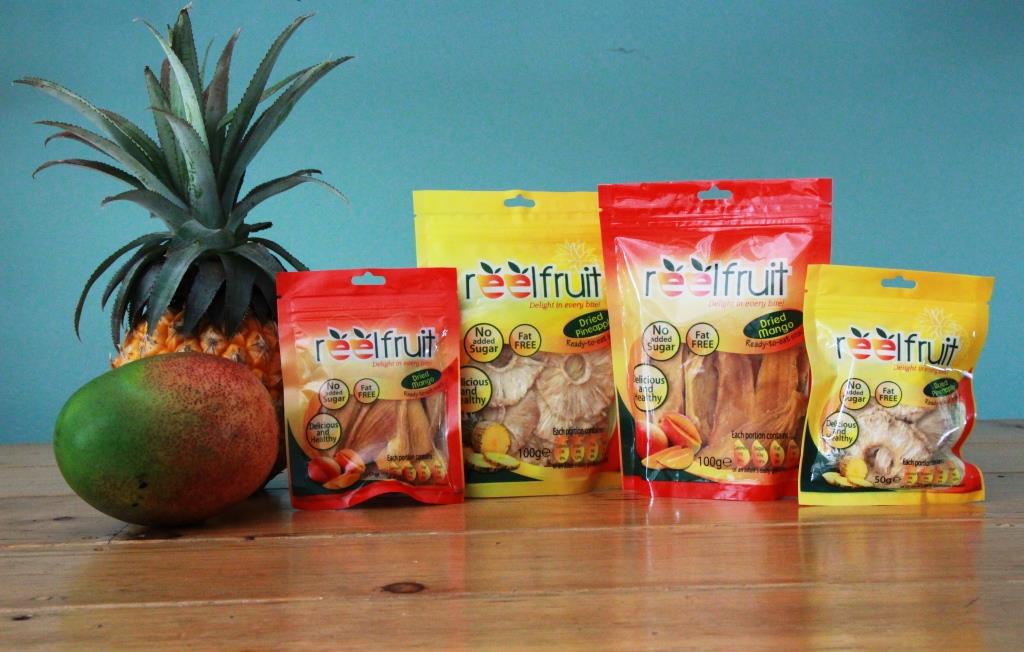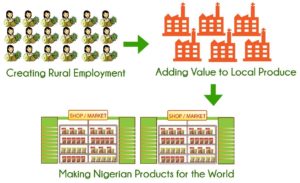

Karina Sudenyte and Maciek Kackprzyk are two young Welsh entrepreneurs who decided to tackle the left-over food and plastic waste problem with one business, Wonky Drinks. The social enterprise was created by the two at ages 20 and 23 with a successful crowdfunding campaign. Within a year, the two were buying ugly, but edible fruit at 70% of market price and bottling the unique juice in recycled glass bottles. In doing so, Wonky Drinks has prevented 175 tons of fruit from going to a landfill. The business’ main source of revenue currently comes from B2B sales with partnerships including Bank of America, HSBC and Merrill Lynch, KPMG, and caterer BaxterStorey. Moving forward, the company’s goals include giving more drinks to charity, reducing 10,000 tons of produce waste, and breaking into supermarkets with different canned drinks.
Karina and Maciek have won a Young Entrepreneur of the Year trophy at the NatWest Great British Entrepreneur Awards 2017 for their work. During their childhood, Karina would help her mom sell household goods and Maciek would attempt to sell paper shoes to his neighbors. Maciek has now earned two masters degrees in law and Karina is focusing on earning a BA in Business Management. Their entrepreneurial spirit coupled with their academic achievements is a testament to the good that can be done when natural creativity meshes with acquired knowledge. 
Meet Gabe Blanchet and Jamie Byron, cofounders and CEOs of Grove Labs. Those that live in the city tend to struggle growing their own food or finding locally grown and organic foods. This is because cities are so full of building after building that there is no room for anyone to make there own gardens or for farmers to use land to farm. Grove Labs is trying to solve this problem.
Grove Labs has developed a device that lets you grow fruits and vegetables hydroponically. The entire setup includes the hydroponic chamber and the mobile app that lets you keep track of the growing conditions. It will also link up to vendors to replenish your materials. Best of all the unit blends in to your kitchen decor and appliances.

Before they could even developed this amazing product they have had to raise funding, so they asked family and friends, as well as took part in the MIT Global Founders’ Skills Accelerator and raised $120,000 to help start there concept. After presenting at an event called R/GA’s demo day they raised another $2 million in funding. Since raising this money they have been able to set up their own office outside of Boston. They aim to manufacture in house on a small scale, but right now they are still in the product development phase. It is amazing to see the many new kinds of inventions that young entrepreneurs are coming up with and creating. Helping make solutions to current problems a reality.
It seems like something straight out of science fiction, but indoor “vertical farming” might just be the future of agriculture. Bowery Farming is a kale-filled farming startup located in northern New Jersey. Irving Fain, the Co-Founder and CEO, wants to connect one of the world’s largest industries with cutting-edge technology.
This modern farming company is pursuing a mission which might just change the future of food and agriculture. Bowery Farming’s proprietary software makes this company so unique. The software makes critical decisions like when to harvest and when to water each plant.
Bowery Farming wants to leverage automation and software with controlled, indoor environments to create a new way of growing food locally. Bowery Farming boast that their facilities are over 100x more productive than the same amount of farmland while using no pesticides and 95% less water.
Irving Fain and Bowery Farming want to give the world improved access to healthier food by better utilizing the resources around us.
The Tanzanian economy is challenging to navigate, particularly for a young female “agripreneur,” one who is making entrepreneurial innovations related to agriculture. Small businesses are supported little by the government. However, since spotting a gap in the agricultural business, 30-year-old Brigite Faustin has worked hard to innovate the business. Most edible oils are imported at high expenses from other countries, with local companies failing to meet quality standards and independent farmers struggling as a result.
In response, Faustin’s business OBRI prioritizes value and quality through the manufacturing of edible oils while supporting local farmers and working to improve the agricultural conditions for better product quality and quantity.
The initial three months were a challenge for Faustin, who doubted her brand would stand out. However, she managed to overcome the challenges and has become immensely successful in her field. Regarding what brought her success, she reflects that “I chose to shed my illusions, understood the core value proposition in my business model, and demystified the workings of the business world.” Faustin sees new opportunities for similar success for Tanzanian women like her in the future. She describes women today as being “ready to work for it” instead of just being satisfied with what is handed to them.
In a changing society, modern African agriculture has become more commercial-oriented, leading to far more opportunities for women, and young entrepreneurs as a whole, to jump on board and launch businesses of their own.
Learn More: https://sheleadsafrica.org/brigite-faustin/
Youth Empowerment Cooperative was started by a group of young entrepreneurs living Durben South Africa. There goal in creating this company was to be able to benefit the world of agriculture and agro-processing with organic spinach and muffins that it supplying to bakeries, retailers, and private customers.
Sphelele Memela, is one of the six directors of Youth Empowerment. He helped start the company with his friends in 2012. He originally created the business so that he could afford higher education and so that he could help his family put food on the table
They started their business out of a local community garden, but were eventually given an unused plot of land on which they could continue to grow spinach and other organic vegetables – carrots, beetroot and cabbage
There business has been recognised as a runner-up for an award at the EThekwini Municipality’s Sustainable Living Exhibition in 2014 and that is when the team decided to focus only on organic spinach. They came up with a rather unique idea of selling spinach muffins and they are now supplying Megacity Spar, bakeries, coffee shops and weddings with there leafy green delectable treats
Their vision as a company is to export their goods to other countries, educate young people about farming because from what they have experienced, the agriculture business in South Africa has a lot of potential.
A san Francisco startup has developed a revolutionary approach to eggs. You read that correctly, this company has changed the egg forever. Hampton Creek has developed a plant-based egg alternative that is both cheaper and more humane. Josh Tetrick, cofounder and CEO, explains that trillions of eggs are produced each year. Often the farms where the animals are housed actually cruelly treat their animals and leave their farms in poor conditions, negatively affecting the environment. Hampton Creek has discovered a product better for us, nicer to our animal friends and the environment.
Factory-farming is an incredibly detrimental industry, for both the animals and the planet. Factories are much more concerned with maximizing profit and product, rather than protecting the welfare of the land. Even freeing the caged animals was ineffective, claimed the CEO. Their business focuses on taking animals out of the equation.
After extensive plant research, Tetrick discovered yellow peas mimic the properties of an egg. In 2013, Hampton Creek’s first product was released- a yellowish egg like powder. This powder allows manufactures to eliminate eggs in baked goods. Tetrick explains this product is 48% cheaper, making it more affordable than regular eggs. Most importantly, Tetrick says, his product has wholly taken animals out of the equation.
Late last year, Just Mayo was released into the market place. This product can be found on the shelves of Costco, Whole foods, and Safeway amongst other places. Sales since last year have tripled since November 2016. Up next for Hampton Creek is an egg- free cookie dough and a cholesterol-free liquid scrambled egg product.
There was seemingly no place for a new egg product, yet Josh Tetrick saw a problem that needed solving. Animals were hurting and the environment was suffering. Tetrick saw that this was an unnecessary problem and he created a product that solves it.
LINK: https://www.entrepreneur.com/article/233878

With an initial investment of $100,000 and a drive to give Nigerians greater access to healthy food, Affiong Williams founded the company ReelFruit which has now grown to a size of seventeen employees and is providing services to 80 stores in Nigeria. ReelFruit suppplies dried fruit which is dried and packages by the company in the capital and distributed throughout the country. Williams says that she saw a lot of potential in the field (using her own money and that of her family to initially back the venture). She was also altruistic in her goal of providing much needed jobs in the country, and has clearly been successful thus far.

Williams spoke to the difficulty of introducing a new product to the agriculture market. She certainly had some apprehension as ” the [agriculture” sector primarily is obviously more complicated than people anticipate. I think there are so many issues with the, sort of structural issue with the sector so for any sort of I think success, it will take a lot of planning and understanding and also a lot of technical understanding.
William’s most inspiring entrepreneurial trait is her is her determination. This is especially helpful when combined with her keen ability to see problems or holes in the market and find a solution. She remarks that she saw a hole in the market and was determined to exploit it, and she has. In reading about her experience in entering the agriculture sector, the most significant thing I learned was the ability of every sector of the market whether agriculture or computer science is very intricate, complicated, and filled with technology- all of which must be understood to be successful in that sphere.
Aditya Agarwalla- Co-Founder of Kisan Network
Kisan Marketplace is an online marketplace connected to farmers in India through a mobile phone app. The farmers use the app to sell their crops to buyers. This system generally makes things cheaper for both the farmers and the buyers, because it cuts out the middlemen and geography which limits them in India.
This business is unique due to the new rise of cheap smartphones in India. Until recently, smartphones were not commonly available to people in India. But with this recent rise, has come a great opportunity to use technology to help the farmers more efficiently deliver their crops to sellers. Aditya Agarwalla 22, dropped out of Princeton University to start this business with his father, a farmer in India. They have a simple app, which farmers download onto their smartphones, and it connects them with a vast marketplace of buyers, with Kisan Network acting as the middleman connecting the two.
Aditya Agarwalla saw a need to sell crops more efficiently for farmers. He tapped into the technology, which at that point was a relatively unexploited field. As the first innovators in this market, the Kisan Network’s success has been remarkable. They have moved over one million pounds of crops in under one year.
If you’re looking for some great stories of innovation and successful start-ups, I would suggest looking for them in Africa. Recently, entrepreneurs in African nations have been realizing their potential at an astounding rate. A fantastic example of this is Affiong Williams and her company ReelFruit.
Williams, who was one of Forbes Africa’s 30 under 30 in 2015, founded her fruit processing company in Nigeria in 2012. The company sells dried fruit and nut snacks, but the impact is much larger. Williams has said that she founded the company because she saw a gap in the market and that “there is untapped opportunity in processing and value addition of raw materials.” She has also said, “I also believe it’s a very budding sector, there is a lot of opportunity as well as the job creation which I think is quite important to me as an entrepreneur to be able to play in an industry that would create a lot of jobs.”
Clearly, Williams is passionate about developing the agribusiness sector of the Nigerian economy as well as the the rural farmers themselves. This info-graphic can be found on their website:
The company’s current product line includes dried mango, pineapple, cashew, banana and coconut snacks. As an ambitious individual, Williams is working on raising capital to open a new, larger factory to produce and package more product as well as expand the product line.
Williams has said, “I hope to be on the cover of FORBES AFRICA in five years’ time.” This company is going places. Look for ReelFruit to expand and to have an incredible impact on the agribusiness economy of Nigeria and beyond.